Boosting gut health and phytochemicals slow prostate cancer progression
.
New research shows a 42% decrease in PSA and an improvement in urinary symptoms among patients receiving a new phytochemical-rich food supplement and a novel probiotic capsule.
.
.
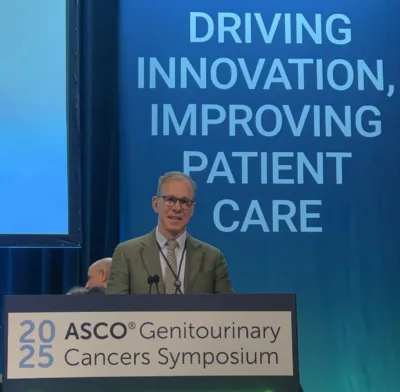
The gut microbiome, home to trillions of beneficial bacteria, plays a critical role in immunity, inflammation control, and overall health. These friendly partners, which improve our daily wellbeing and help prevent many chronic diseases are now being harnessed by scientists to fight prostate cancer.

This nutraceutical supplement, now know as Yourphyto still contains the same quantities of pomegranate, broccoli, green tea and turmeric, shown to be beneficial in the original study, but it has been significantly improved and upgraded. This included a process which detected and excluded contaminants such as heavy metals and pesticides as well as measured and standardisation of the candidate phytochemicals, ensuring each batch maintained its consistency, effectiveness and safety. What’s more, traditionally, supplements either have extracts of plants or dried whole plants – uniquely, this new supplement has both. This, not only, ensures an even wider spectrum of synergistically acting natural elements from the whole plant, it significantly increases levels of the most active phytochemicals responsible for the health benefits. 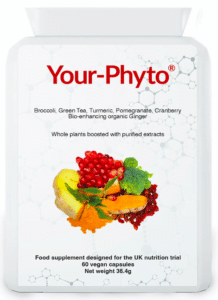
The trial was led by the same team of doctors and nutritional scientists from Bedford and Addenbrooke’s Cambridge University Hospitals who conducted a similar study 14 years ago. Men with progressive prostate cancer were given the opportunity to try these nutritional interventions before considering radical treatments or hormone therapies, which have significant risks and toxicities which impact quality of life.
Phytochemicals and probiotics work together: Phytochemicals have numerous modes of actions. They reduce chronic disease by dampening down excess inflammation and supporting anti-oxidative pathways which protect our DNA from by-products of energy production and toxic chemicals. They improve vitamin D absorption, directly slow the growth of cancer cells and act as prebiotics which helps support healthy bacterial growth and hence improve gut wall integrity. It is not a surprise that laboratory studies show they also help the colonisation of beneficial probiotic bacteria after oral consumption. In return, probiotic bacteria assist the breakdown of larger phytochemicals to more biologically active components.
In this study, the average age of the men was 68 years. They all had histologically confirmed prostate cancer and were not taking hormones therapies. Some were managed with active surveillance and others were experiencing a PSA relapse post radiotherapy or surgery. After all men were given Yourphyto, they were then randomised to receive either a placebo or a capsule containing probiotics with similar packaging to make them look the same – a process called blinding which removes potential bias.
The probiotic capsules, now commercially known as yourgutplus+, contain 5 non-histamine inducing, lactose secreting lactobacillus bacterial strain, combined with a 1000iu of vitamin D and a good quantity of a prebiotic called inulin, made from chicory. It has a delayed release vegan capsule and no artificial preservatives, colours, and sweeteners which could have adversely affect bacteria growth. The aim of this supplement is to shift the profile of bacteria in the gut from an inflammatory to an anti-inflammatory profile. Reassuringly, it was proven to be safe and beneficial in two previous covid studies.
The results
PSA: In men randomised to receive the phytochemical-rich supplement on its own (placebo group), the PSA doubling time was 19 months during the 4 months before the study began, and it slowed three fold to 62 months after the start of the trial. This indicated a good response to the phytochemical rich supplement.
In the men randomised to receive both the phytochemical-rich supplement plus the probiotic supplement, there was a highly significant, 42%, decrease in PSA progression after the start of the trial. This meant that, for most men, despite PSA increasing before the trial, levels actually fell after the combine intervention – Indicating a major further effect of combining the specific probiotic blend to the phytochemicals.
MRI: Reassuringly, an analysis of MRI changes, which is ongoing, showed stable disease for most men, although 5 showed disease regression, and 9 showed progression. All patients who demonstrated progression on MRI also had PSA progression suggesting no PSA masking effect but a genuine effect on the tumour itself.
Trial impact: Before the trial, the average PSA was doubling over 19 months (PSA doubling time) so men were contemplating leaving active surveillance for hormones, surgery or radiotherapy which have significant side effects. In view of the stabilising or falling PSA (supported by MRI), only 9 men actually decided to opt for radical treatments (8 in the placebo group and 1 in the probiotic group) after the trial.
About these supplements: Men in the trial received these supplements free of charge, however, because they are classed as food supplements, not drugs, they cannot be prescribed by doctors despite this formal medical evaluation. All men were given a post-trial diet and lifestyle sheet with advice on how to improve gut health and phytochemical food intake. In addition and fortunately, since the end of the study the manufactures have made them available via their websites; Yourphyto.com and Yourgutplus.com.
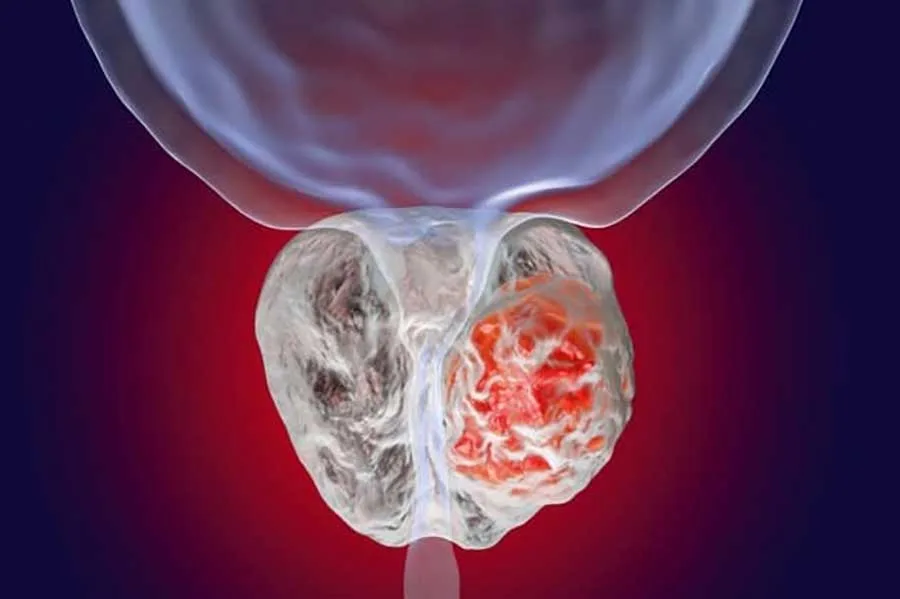

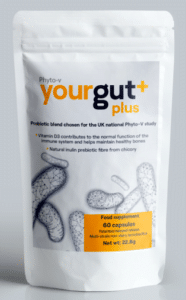

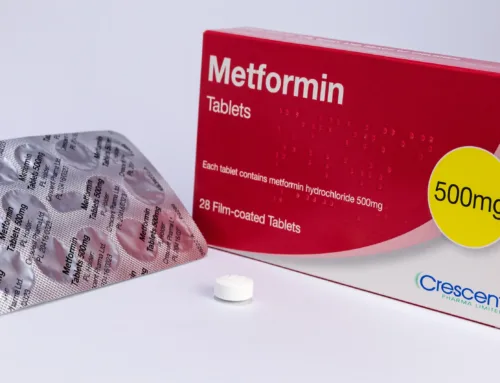



Dear sir,
Your article gut-health-and-prostate-cancer states the following :-
The probiotic capsules, now commercially known as yourgutplus+, contain 5 non-histamine inducing, lactose secreting lactobacillus bacterial strain, combined with a 1000iu of vitamin D and a good quantity of a prebiotic called inulin, made from chicory.
But the website yourphyto.com to buy the product states :-
This probiotic formula provides a natural, non-dairy source, live product. The daily serving provides a minimum of 10billion bacteria from 5 different strains.
Bacterial Cultures
• Lactobacillus plantarum
• Lactobacillus rhamnosus
• Lactobacillus bulgaricus
• Lactococcus lactis
• Lactobacillus paracasei
Vitamin D3 (800iu per serving)
Inulin made from whole chicory
Unique delayed release vegan caps
No added sugars, preservatives, sweeteners or colours, lactose and gluten free. The inert anti-Caking Agent ismagnesium Stearate.
There it is only 800iu of Vitamin D – why the difference and which is correct?
I trust the full results when published will clarify the situation as to what level of Vitamin D is provided
I was a member of the original trial of Pomi T by Professor Thomas at Bedford hospital many years ago when I had low level prostate cancer and now cancer free having continued to take 2 Pomi T a day since that trial.
Kindest regards
John Gifford
Hello Mr Gifford
Thank you spending time to pointing out the difference on the the two websites – we have informed them – it was 1000iu vitamin D on the trial. The full results will be published in Jan 2025. Many men are switching to Yourphyto already
regards
Keep-healthy editorial team
This website, and other videos I have found with Professor Thomas, makes reference to the potential benefits of probiotics during and after chemotherapy treatment.
I have looked in the FAQs but have been unable to find any reference to the safety of Yourphyto and Yourgutplus during treatment (specifically docetaxel). Is there any guidance that could be offered regarding when it would be appropriate to take? The Pomi-T website FAQs suggest caution just before / after any infusion – is this also be applicable to Yourphyto? I am struggling to understand whether there could be any safety concerns with the probiotics.
I am assuming that there are likely benefits – or at least unlikely harm – for men with advanced prostate cancer on ADT who take these supplements per the guidance, but is there any caution you would advise? (I am aware that the trials have been based on earlier forms of the disease so that there is likely limited specific evidence of impact on men with advance prostate cancer.)
With thanks in advance.
Hello Adrian Pinder
Thank you for your question which highlights the issue of taking phytochemical and probiotics during chemotherapy, including docetaxel.
Several studies have shown that probiotics (particularly those containing lactobacillus such as Yourgutplus) during chemotherapy actually improve safety ad reduce side effects such as diarrhoea – although further studies would always be welcome.
It has been quoted that the phytochemicals in these foods, as well as protecting normal cells could potentially reduce the action of chemotherapy. This has not actually been substantiated in fact a review of all the published data by the National Cancer Institute including a comprehensive systematic review concluded that phytochemical rich foods actually reduces the side effects of chemotherapy or radiotherapy, resulting in improving patients’ quality of life. A number of studies reported that, these food actually increased patient survival time and decreased tumour markers’ level. Not all oncologist or chemotherapy staff have read this data so a sensible approach would be to stop the yourphyto 1 day before and 3 days after the administration of chemotherapy.
I have prostate cancer and have been taking PomiT for 10 years. I combine this with green tea.
The advice on Yourphto says avoid green tea.
Yourgutplus makes no mention of green tea.
I dont want to give up green tea. Could you advise please?
Peter Weightman
Hello Peter
Thank you for your very relevant question. There is the same amount of green tea in pomi-t as yourphyto. YourPhyto has higher levels of the other healthy phytochemicals found in Turmeric, broccoli, pomegranate as well as two new ingredients cranberry and organic ginger which enhances the absorption of phytochemicals and polyphenols. The trial, presented in ASCO last week showed a significant effect on PSA progression (greater than the previous trial in 2013). The average PSA actually fell in the men who also took the Yourgutplus with the Yourphyto. Combined with improvements in food standardisation this is clearly a more advanced and scientifically proven supplement
As regards the green tea issue – all supplements (including pomi-t and yourphyto) are now required by the regulatory authorities to carry a comment about taking other green tea products as it contains caffeine – Actually YourPhyto has the same level of caffeine as a quarter of one cup of tea so unless you are one of the extremely rare group of people who have an intolerance or sensitivity to caffeine (who this comment is targeting) it is safe to drink green tea in reasonable quantities.
Thank you again for your question which highlighted this issue
The article references the PSA doubling time for the group receiving the placebo. What is the data for the group receiving both supplements?
Hello
Thank you for your question
As you correctly pointed out doubling time reduced from 19 months to 64 months in the yourphyto group only (so still went up slowly) – indicating a benefit from this alone.
In the group combined with yourgutplus the average PSA fell so you can’t calculate PSAdt (about a 20% drop)- indicating a better benefit with the combined supplements
The difference in PSA progression between the two groups was about 40%
Dear Prof Thomas
Thank you for your, and your teams’ work. I hope it is ok to ask a few questions. Many thanks for your help.
1. Do you think YourPhyto and/or YourGut+ are indicated in someone post-surgery for higher risk prostate cancer who had clear margins on pathology and has had PSAs of “zero” for two-years post-surgery?
2. I was curious about the CFU of 10 billion for YourGut+ versus products like VSL#3 and Symprove that have much higher CFUs? What are your thoughts about this?
Thank you again
All good wishes
Simon
Apologies for the delay in answering. The trial showed a significant benefit for men with lower risk disease. It is harder to do a trial in men with higher risk disease as we cannot wait. In my opinion,as this trial proves and beneficial effect on prostate cancer, it is likely to help prevention in the first place and the risk of relapse. As pointed out by the peer review you, cannot extrapolate the benefit of these selected lactobacillus to other probiotics. Its not about the strength but the combination of species which were selected specifically for these studies.
May I ask if this is still beneficial to chronic Crohn’s disease patients – following radical protectomy? On hormone treatment and a trial drug for next two years. Thank you.
Hello
Many agree that strategies to improve gut health in Crohn’s disease is beneficial and some data to support probiotics – especially the safer varieties such as lactobacillus as in Yourgutplus.
There is emerging evidence that ADT (hormones) can interfere with gut health and over time may be one of triggers for hormone resistance. A health gut will also reduce some of the side effects of ADT (fatigue, Joint pains especially) I strongly advise measure to improve the gut microbiome in men on ADT
Concerning the optimum dose of supplements.
I now take 1 Yourgut+ in the morning and one Yourphyto in the evening.
Should this be 2 of each? I wasn’t sure from the conference talk.
Best wishes
Peter
Hello
Thank you for your question. In the trial men took one of each in the morning and then one of each lunch time. There is a very small amount of caffeine in YourPhyto so may not be best to take in the evening
Hello Dr Thomas,
If someone is on hormone therapy for prostate cancer, and also starting chemotherapy soon. Is it advisable to take both supplements? Or wait until chemotherapy has been completed. I noted you said above to stop the supplement a day before, but with hormone therapy and chemotherapy (potentially radiation later), are there other considerations?
Many thanks
Hello – in my opinion – no – it is important to maintain gut health during chemotherapy and radiotherapy. If you take a probiotic, it would be better to stick with a lactobacillus blend.